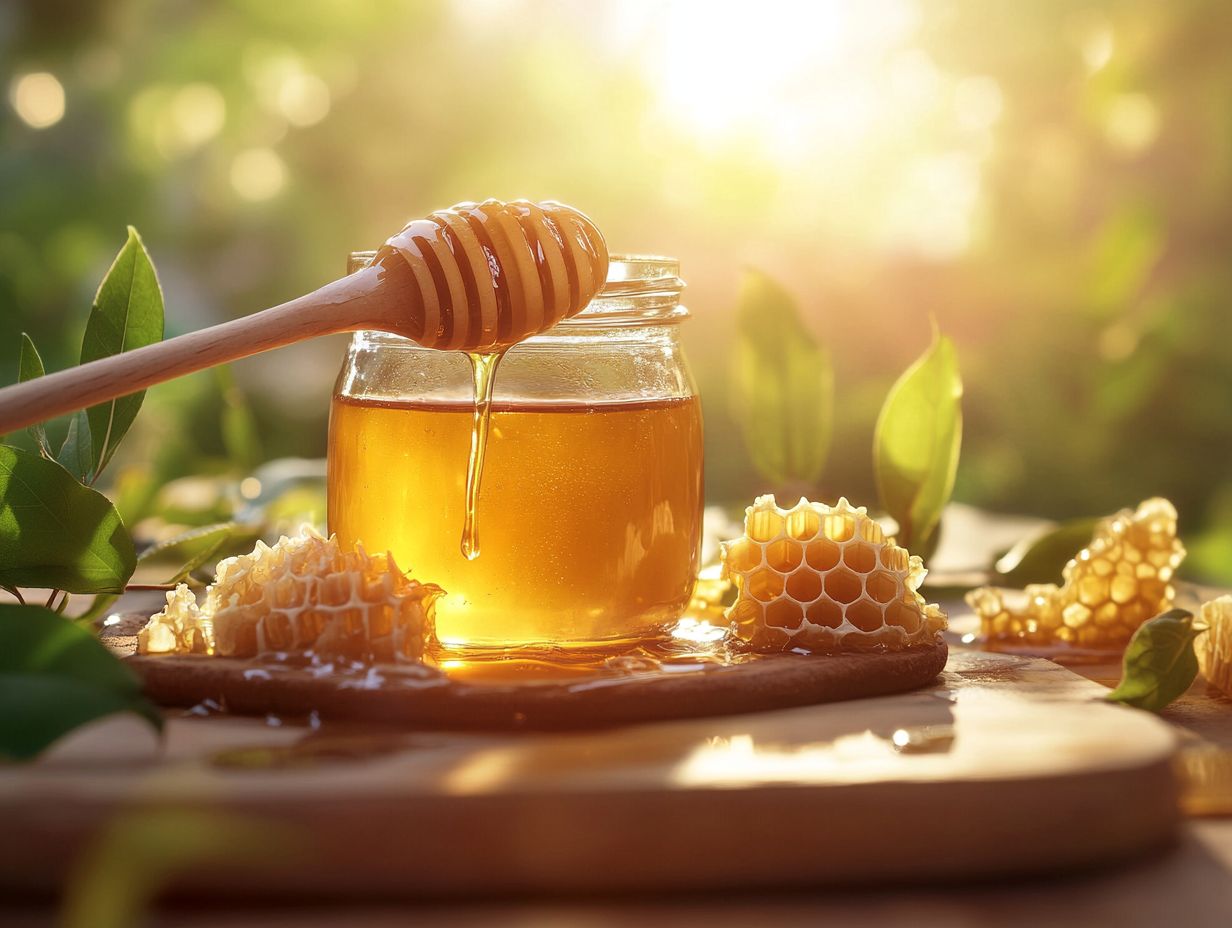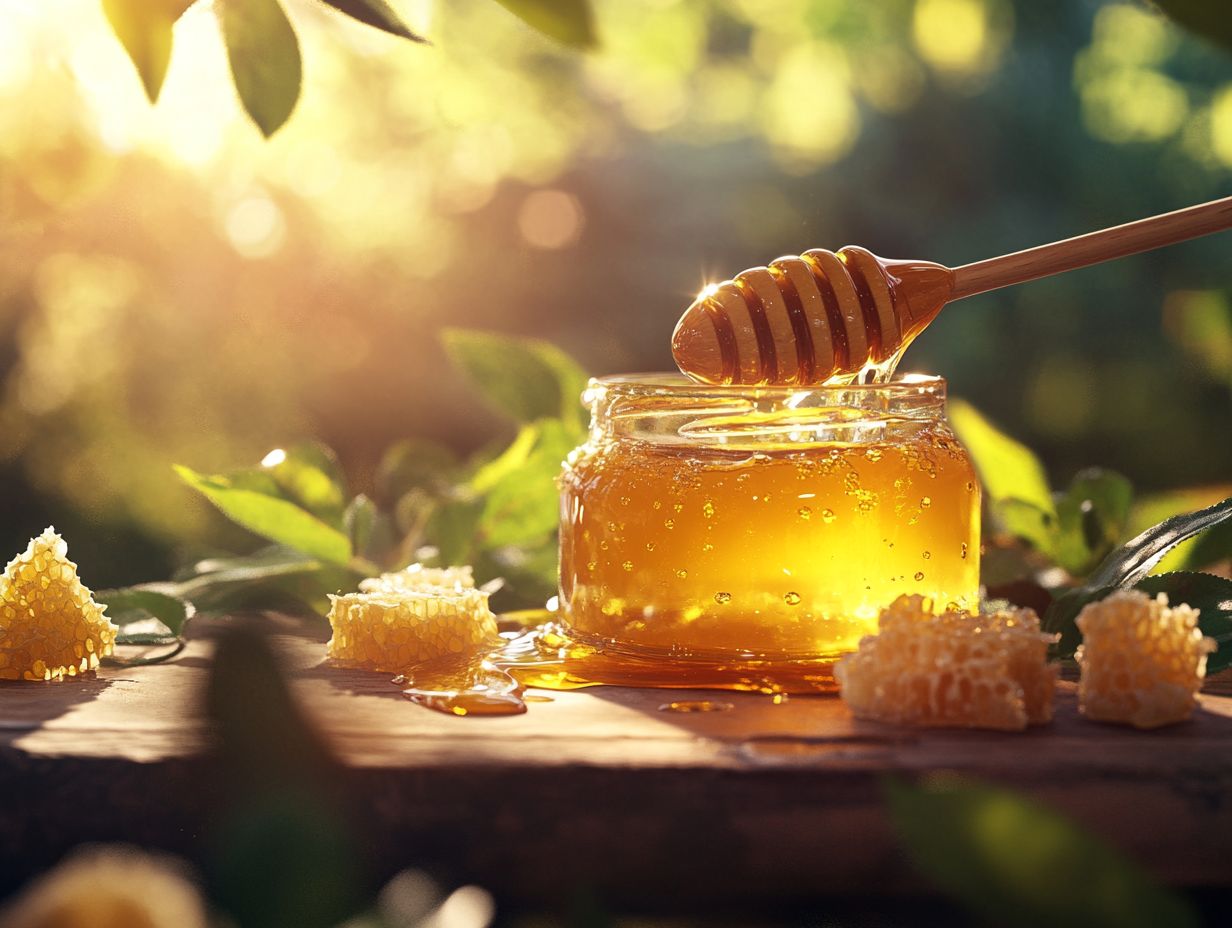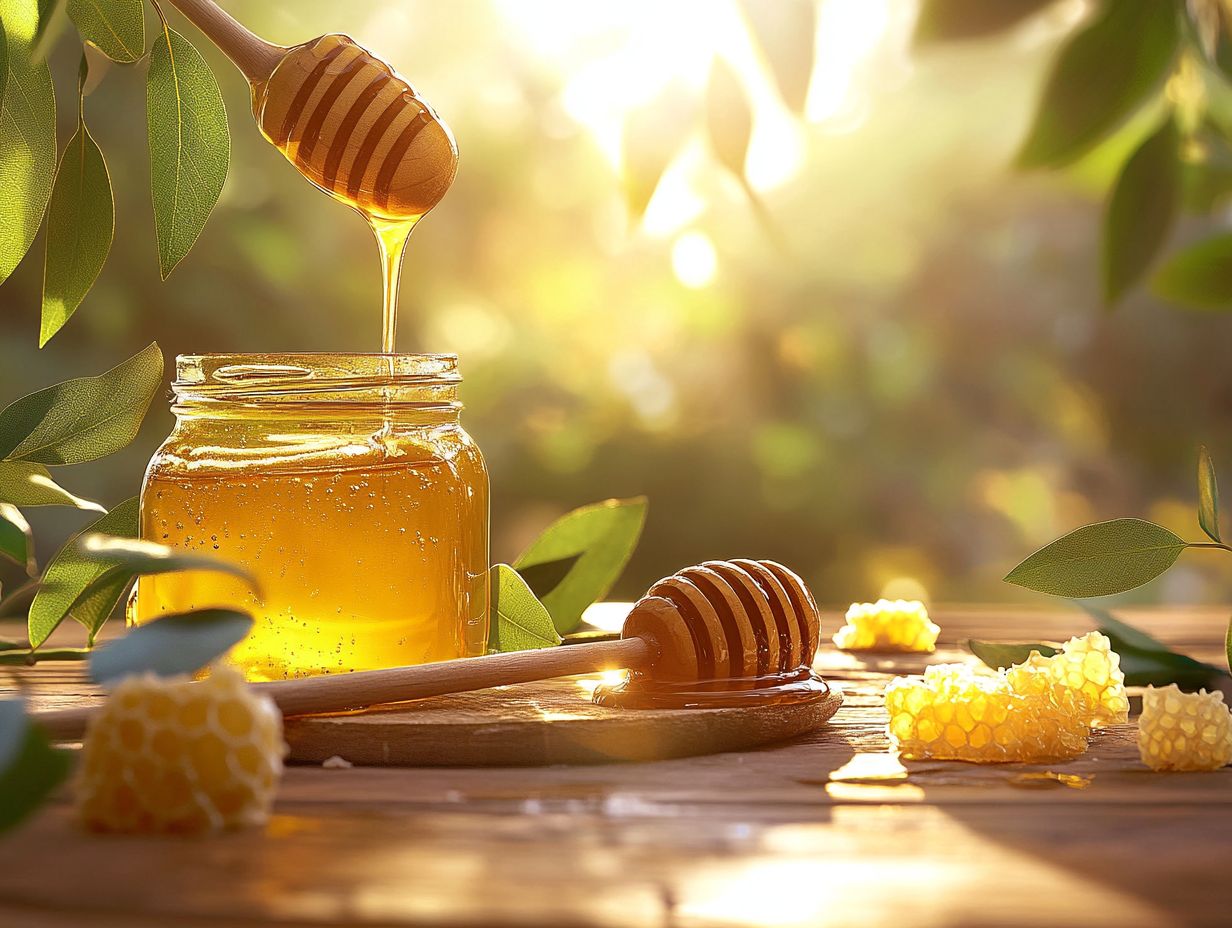Raw honey has garnered attention not just for its delicious taste, but also for its remarkable benefits in skincare.
Packed with natural nutrients, it offers moisturizing and healing properties that can transform your beauty routine.
With its antibacterial and anti-inflammatory effects, raw honey is a versatile addition to any regimen.
This guide covers its benefits, how to incorporate it into your skincare, tips for selection and storage, and essential precautions to keep in mind.
Discover how this golden elixir can enhance your skin’s health and radiance.
Key Takeaways:

What is Raw Honey?
Raw honey, often described as a golden liquid, is a natural substance produced by bees from the nectar of flowers. Unlike processed honey, raw honey retains its essential nutrients, including vital vitamins, minerals, and enzymes, which makes it a highly sought-after ingredient in skincare and beauty routines.
Its unprocessed nature ensures that it maintains its complete range of antioxidants and healing properties, both of which are esteemed for their benefits to skin health and beauty. This sweet substance has been utilized for centuries by various cultures, including Egyptian women, for its notable properties.
Furthermore, the production process of raw honey—extraction from beehives without the application of heat or filtration—contributes to the preservation of these beneficial compounds. The result is a rich, viscous product that is abundant in nutrients such as B vitamins, vitamin C, and a variety of minerals, including calcium and iron.
In contrast to processed varieties, which are often stripped of essential nutrients and flavors, raw honey is distinguished by its unique taste and myriad therapeutic benefits. As a natural humectant, it hydrates and nourishes the skin, making it a preferred choice among natural skincare enthusiasts seeking effective and holistic solutions.
Benefits of Using Raw Honey on Skin
The advantages of utilizing raw honey on the skin are extensive, encompassing its moisturizing and healing properties, as well as its efficacy as a natural exfoliant and antibacterial agent. This substance functions as a humectant, attracting moisture to the skin, thereby helping with the maintenance of hydration levels and overall softness.
Rich in antioxidants, raw honey contributes to the management of skin conditions such as acne and blemishes, while also fostering a radiant complexion and diminishing the visibility of scars and hyperpigmentation. Additionally, it is suitable for all skin types, making it an invaluable component of any beauty regimen.
Moisturizing and Healing Properties

Raw honey is widely recognized for its outstanding moisturizing and healing properties, making it an excellent option for maintaining skin health. As a natural humectant, it attracts moisture from the environment, thereby helping with keeping the skin hydrated and supple. The healing capabilities of raw honey extend to a variety of skin conditions, offering nourishment and support for skin regeneration, which aids in the recovery from wounds and blemishes.
This makes it especially advantageous for individuals with dry, sensitive, or acne-prone skin. By forming a barrier that retains moisture while penetrating deeply to alleviate irritation, raw honey ensures that the skin feels rejuvenated and revitalized. Its natural enzymes and antioxidants work in concert to combat free radicals, thereby promoting a brighter complexion.
Individuals experiencing eczema or psoriasis may benefit from raw honey’s anti-inflammatory properties, which help to diminish redness and discomfort. By incorporating this golden elixir into skincare routines, users can experience not only enhanced hydration but also a comprehensive approach to skin wellness.
Antibacterial and Anti-inflammatory Effects
The antibacterial and anti-inflammatory properties of raw honey position it as a formidable ally in addressing various skin concerns, including acne, redness, and inflammation. Its natural antimicrobial qualities inhibit bacterial growth on the skin, thereby preventing outbreaks and promoting a clearer complexion.
Furthermore, raw honey’s anti-inflammatory attributes help to calm irritated skin, rendering it an ideal option for individuals with sensitive skin types and various dermatological conditions.
Along with these advantages, research has demonstrated that raw honey can facilitate wound healing, offering supplementary support for those dealing with acne scars or inflammatory skin reactions. Its viscous consistency forms a protective barrier that retains moisture while excluding harmful pathogens, effectively expediting the skin’s healing process. Anecdotal evidence also suggests that individuals have reported reduced redness and enhanced overall skin texture following regular use.
Therefore, integrating this natural substance into skincare regimens can significantly benefit those seeking to improve their skin health.
How to Incorporate Raw Honey into Skincare Routine
Incorporating raw honey into a skincare routine can significantly enhance beauty regimens and offer numerous benefits for the skin. Its versatile applications range from serving as a natural moisturizer to being a key ingredient in DIY facial masks.
By integrating raw honey into one’s beauty regimen, individuals can take advantage of its moisturizing, healing, and antibacterial properties, ultimately leading to healthier and more radiant skin.
DIY Honey-based Skincare Recipes

Creating DIY honey-based skincare recipes presents an engaging and effective method to leverage the benefits of raw honey for skin care. These formulations can encompass facial masks, scrubs, and moisturizers that utilize raw honey’s inherent properties, including its moisturizing, antibacterial, and exfoliating characteristics. By incorporating raw honey into these DIY products, one can design personalized beauty solutions tailored to specific skin requirements.
Raw honey is rich in a variety of vitamins and minerals that not only nourish but also rejuvenate the skin, making it an ideal component for individuals seeking to enhance their beauty regimen. From calming irritated skin to promoting a healthy glow, the inclusion of raw honey in skincare routines can significantly improve cleansing and hydration practices.
Whether combining it with yogurt for a soothing mask or blending it with sugar for a gentle exfoliating scrub, the possibilities are extensive. This discourse will explore several straightforward yet effective recipes that not only provide sensory enjoyment but also deliver the natural care that your skin deserves.
Tips for Choosing and Storing Raw Honey
Selecting and storing raw honey appropriately is crucial for maintaining its quality and health benefits. When choosing raw honey, it is important to identify reputable brands that prioritize purity, unprocessed characteristics, and the presence of beneficial nutrients.
Furthermore, employing correct storage methods will help preserve its therapeutic properties and extend its shelf life, enabling individuals to fully benefit from its advantages for skincare.
Factors to Consider when Purchasing
When purchasing raw honey, it is essential to consider several factors to ensure the acquisition of a quality product that provides its full range of benefits. Consumers should seek labels indicating that the honey is unprocessed, rich in antioxidants, and sourced from reputable beekeepers, as these characteristics signify high-quality raw honey that retains its natural properties.
The floral source of the nectar significantly influences both the taste and nutritional profile of the honey, making it important to determine whether the product is monofloral or polyfloral. Processing techniques, including heating and filtering, can diminish vital enzymes and nutrients, thereby compromising the health benefits associated with raw honey. Additionally, consumers should assess the environmental practices of the producers, as sustainable beekeeping not only supports bee populations but also ensures the purity of the honey.
By remaining informed and discerning, shoppers can select raw honey that is not only flavorful but also abundant in health-promoting qualities.
Proper Storage and Shelf Life

Proper storage of raw honey is essential for preserving its quality and extending its shelf life, thereby allowing individuals to enjoy its numerous benefits over time. It should be kept in a cool, dark environment, away from direct sunlight, and ideally stored in a glass container to prevent the absorption of undesirable odors or contaminants.
To further enhance its preservation, it is important to maintain a stable temperature, as fluctuations can adversely affect the honey’s texture and flavor. The ideal temperature range is between 50°F and 70°F; temperatures exceeding this range may lead to the degradation of beneficial enzymes.
It is advisable to seal the container tightly to prevent moisture absorption, which can result in fermentation. While raw honey boasts an impressive shelf life, it can eventually crystallize or exhibit signs of spoilage, such as off odors or unusual discoloration. These signs may indicate that the honey is past its prime and potentially unsafe for consumption.
Potential Side Effects and Allergies
Raw honey is typically safe for the majority of individuals; however, potential side effects and allergic reactions may occur, particularly in those with sensitive skin or specific allergies.
It is crucial to understand these risks to ensure that the incorporation of raw honey into one’s skincare routine is both advantageous and safe.
Precautions and Warnings
When utilizing raw honey, it is essential to take specific precautions and heed relevant warnings to avoid adverse reactions. Individuals who have known allergies to bee products or pollen should exercise caution and consider consulting a healthcare professional prior to incorporating raw honey into their skincare regimen.
Those with sensitive skin may experience irritation or breakouts, as raw honey can sometimes exacerbate existing conditions. It is advisable to perform a patch test on a small area of skin to assess any potential adverse effects before applying it more broadly.
In case of irritation—such as redness, swelling, or itching—immediate action should be taken. The affected area should be rinsed with cool water, use should be discontinued, and a dermatologist should be consulted if necessary.
Being proactive and well-informed can help ensure a positive experience when harnessing the benefits of this natural remedy.


